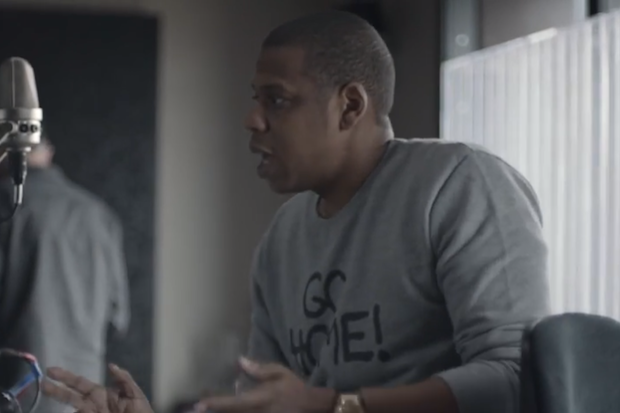When you’re watching the three-minute teaser for Jay-Z’s upcoming album Magna Carta Holy Grail, it is easy to forget that it is really just a lengthy commercial for Samsung. A mostly hand-held, Fade to Black-like snapshot of Jay in the studio recording and attempting Ray Lewis-like speeches to his crew of producers and engineers is sorta exciting if you don’t think about it too hard. Rick Rubin, Pharrell Williams, Swizz Beatz, and Timbaland are all there! That one beat almost sounds like the theme song to River’s Edge or something, and then it goes dubstep, but, like, real U.K. dubstep, not the hammy brostep wub-wub heard on Watch the Throne‘s “Who Gon’ Stop Me” (and yes, we know Flux Pavilion is English)!
Samsung has purchased a million copies of the upcoming Jay album and will be providing it to their Galaxy phone customers three days before the record enters stores and digital locations like iTunes. This is a low-key commercial for an imminent Jay-Z/Samsung game of synergy that is going to sell what will be just another Jay-Z album as a slab of high-minded rap art and Who Moved My Cheese?-esque business brilliance all at once, when it’s really neither. Jay-Z’s Twitter ramped up this angle, presenting Samsung’s plan as some kind of paradigm-shifting rocking of the industry: “If 1 Million records gets SOLD and billboard doesn’t report it, did it happen? ha. #newrules #magnacartaholygrail Platinum!!! VII IV XIII.” That tweet is way more revealing than it probably intends to be. Namely, it is evidence that the distribution model and corporate involvement surrounding this album is what actually matters. His business plan for promoting the album is based on the idea of the album as a business plan.
There’s also a legendarily head-up-his-ass insider quality to that tweet because it engages in business talk that music fans just don’t follow. Yes, we’ve all been trained to consider sales numbers, turning popular art into a numbers-crunching sports exercise, but just sit back and think of the inside baseball going on here: The ever-evolving, “What’s a sale” debate that finds Billboard changing its algorithms gets transformed into some pseudo-visionary hip-hop boast, grandiosely thrown at Jay-Z’s fans. Normal people don’t care about this process, but they’re being made to care because Jay-Z is inserting himself into the process. In that commercial/trailer, Jay-Z pontificates on the Internet, calling it “the wild wild west,” framing Magna Carta Holy Grail (just a terrible title, by the way) as a product that will explore this territory. He’s assisting a corporate manipulation of music from top-down and painting it as some Steve Jobs-like burst of brilliance. It’s Kanye’s Yeezus “rap game Apple visionary” buld-up already turned into a marketing scheme.
Also, you have downed a pretty undiluted strain of business-fuck Kool-Aid when you can consider literally selling your album to a corporation as establishing “new rules.” Yes, this is an unprecedented kind of selling out, but that doesn’t really mean anything anymore, especially in the world of rap which has always been more bottom line-oriented. Regardless of one’s opinion on the topic, it is a guy teaming up with a phone company and selling his album to them, so that they can sell it to some of you early, as if that’s something you should be thankful for, or would even want? It doesn’t matter if this album is any good. It has already sold a million copies. It’s an obnoxious, possessive attempt to stop album leaks and a gross way to sell music fans on the idea of full-stop corporate crossover as a necessary (or even revolutionary) act.
Plus, this isn’t some mid-level rap or metal band teaming up with Scion for a cash infusion, this is one of the richest and most successful rappers/businessmen on the planet gaming the system with the help of a big corporation. It’s not about sales. It’s about will-to-power domination (winning on top of winning, just because) and taking momentary control of something (the music industry) that is slipping away from the people who used to be in control. This could not be more status quo. Corporations and the old guard have gotten everything wrong about the Internet, so unsurprisingly, they will now pat themselves on the back for a feckless manipulation and paint it as being with-it and adjusting to the times. Here’s how Internet rap and artistic sustainability really play out: Locate a way to control every element of an album (i.e., product tie-in), including its first-week sales buzz, and package it as game-change. Don’t buy into it.





